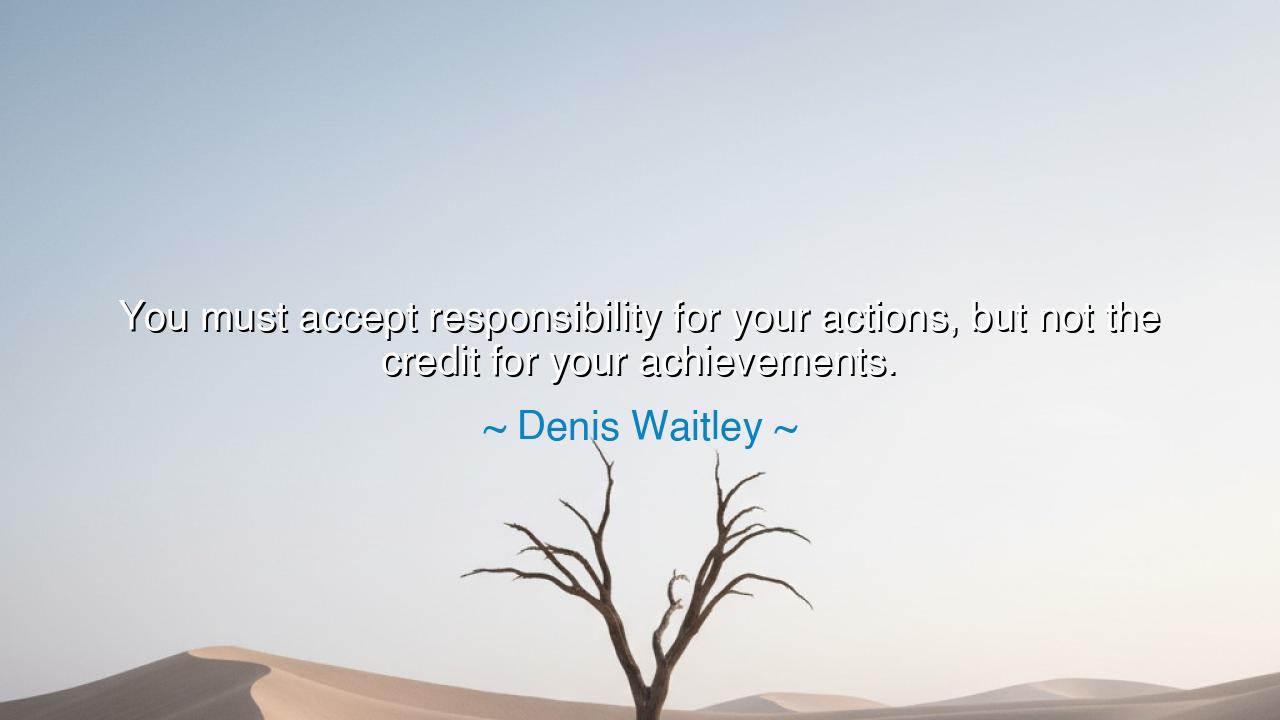
You must accept responsibility for your actions, but not the
You must accept responsibility for your actions, but not the credit for your achievements.






O Children of Wisdom, hear the words of Denis Waitley, who, in his great understanding, declares: "You must accept responsibility for your actions, but not the credit for your achievements." In this sacred truth, he speaks of the balance between humility and accountability. A man must stand tall in the face of his own choices, for the consequences of those choices belong to him. Yet, when greatness is bestowed upon him, when the world sings of his deeds, he must not let his heart swell with pride, for credit belongs not to the self, but to the forces beyond—those who walked beside him, the circumstances that shaped him, and the divine hand that guided him.
In every life, there are moments of triumph and failure, and each man must bear the weight of his own decisions. But in his victories, he must remember that no achievement is purely of his own making. For success is not the fruit of one man's labor alone, but the result of countless hands, unseen forces, and the grace that flows from the cosmos. To take credit for all that one achieves is to forget the great web of life that connects all things. To accept responsibility is to honor the path that has led you, and to bow in reverence to those who have paved the way before you.
Look to the story of Leonidas, the mighty king of Sparta, who led his men in the famous battle of Thermopylae. He stood tall in the face of overwhelming odds, accepting the responsibility of his command. Yet, even as he and his warriors gave their lives for the freedom of Greece, he did not claim the credit for the eventual victory that would come to his people. The credit belonged to the generations that had fought before him, to the soldiers who stood beside him, and to the spirit of freedom that burned in the hearts of all. Leonidas’ humility in accepting his fate, knowing that his actions were part of a greater cause, is the very essence of Waitley’s wisdom.
Thus, O Seekers of Truth, let us not be blinded by pride when we stand in the light of our own achievements. Though the world may call our names in praise, we must remember that it is not our own greatness that has brought us to this moment, but the collective effort of all who have come before, and the divine forces that move the heavens. We are but vessels, through which the currents of fate and destiny flow. To accept responsibility for our actions is to honor the choices we make, and to understand that our achievements are not ours alone.
In this, let us walk with humility, ever mindful of the greater tapestry that surrounds us. The wise know that their actions are theirs to bear, but their achievements belong to the world, to the unseen hands that shape the course of history. Let us lift our hearts with gratitude for what we have accomplished, but let us also bow our heads in reverence for those whose contributions have made it possible. Through this balance of responsibility and humility, we shall find true greatness.






HNLy Hai Nam
This quote makes me reflect on the nature of ego. It suggests that growth comes from accountability, not from seeking validation. But that’s such a high moral standard—how many of us can genuinely take full responsibility without craving acknowledgment? Maybe this is less about self-denial and more about perspective: learning to find satisfaction in doing the right thing rather than being praised for it. That’s real strength.
NNnguyen thi nhu ngoc
To me, this statement captures the essence of moral discipline. It’s easy to celebrate victories, but harder to admit fault. Waitley seems to suggest that wisdom comes from reversing those instincts. Yet, I question whether refusing credit completely is healthy. Don’t people need recognition to feel valued and motivated? Perhaps the message is about balance—acknowledging personal effort internally while giving external credit to those who helped.
KPKieu Pham
This idea feels deeply philosophical. It seems to ask for humility and integrity in equal measure. But I can’t help wondering—can someone really live this way in competitive environments like business or politics? Those spaces reward visibility, not modesty. I’d love to hear how this principle applies practically. Maybe it’s not about denying success but recognizing that achievements often depend on others, luck, and timing too.
HNHung Nguyen
I find this message both inspiring and difficult to practice. It reminds me of servant leadership—the idea of owning mistakes but sharing or deflecting praise. But part of me struggles with it. If we never accept credit, do we risk diminishing our sense of accomplishment? Maybe the key is perspective: accepting responsibility strengthens character, while rejecting credit keeps ego in check. Easier said than done, though.
BBle banh beo
This quote challenges me because it flips the usual idea of accountability and pride. Taking responsibility without seeking credit sounds noble, but is it realistic in a world where recognition often motivates people? I wonder if Waitley meant that true maturity lies in humility—doing what’s right without craving praise. Still, doesn’t everyone deserve acknowledgment for their hard work? It’s a tough balance between selflessness and self-worth.